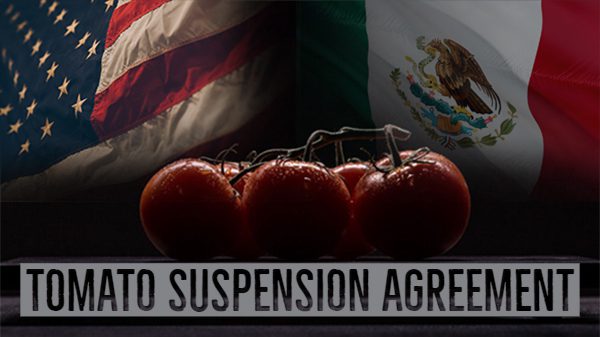NOGALES, ARIZ. (October 10, 2023)– Last week, the U.S. Department of Commerce (Commerce) announced preliminary findings from its third administrative review of the 2019 Tomato Suspension Agreement (TSA), debunking the allegations by a special interest group seeking to terminate the TSA. The results throw cold water on claims from the Florida Tomato Exchange (FTE) arguing that the TSA had been violated by two signatories, rendering the TSA “unenforceable.”
Following an intense fact-gathering phase in which it collected significant data from the two signatories under review, Commerce has preliminarily determined that the TSA functioned as intended and that the signatories have, in fact, complied with the numerous requirements of the TSA. Any minor instances of non-compliance were found to be inconsequential, inadvertent, and limited, falling short of what would be considered a violation of the TSA.
After Commerce initiated this review, the FTE requested in June that Commerce terminate the TSA, which includes numerous obligations that signatories and their selling agents must follow to import and sell fresh tomatoes from Mexico in the U.S. market. Termination of the TSA would dramatically restrict the supply of fresh tomatoes, thereby reducing competition on grocery store shelves, raising prices for U.S. consumers at the check-out counter by an average of 52% nationally, and boosting the profits of a small handful of wealthy Florida tomato-growing conglomerates at the detriment of Arizona and other states’ economies.
Key takeaways from the review by Commerce include:
- The two signatories under review generally complied with their numerous obligations under the TSA.
- Minor incidents of noncompliance do not rise to the level of “Violations” that materially frustrate the TSA, affirming that Commerce has not found a single violation of the TSA to date.
- To address minor instances of noncompliance, the signatories in question have addressed how they plan to prevent any such incidents in the future, demonstrating Commerce’s ability to effectively monitor and enforce the TSA.
- The TSA continues to satisfy all applicable legal requirements.
- This review mirrors previous reviews. Over time, Commerce has reviewed tens of thousands of sales transactions and sellers of tomatoes from Mexico, with no finding of substantive violations.
“Through their review, the Department of Commerce summarily debunks the Florida Tomato Exchange’s litany of bogus allegations. It’s time for the FTE to face these facts and abandon their flailing attempts at a power grab over the tomato market,” said Lance Jungmeyer, President of the Fresh Produce Association of the Americas BB #:144354. “We have seen an outpouring of support for the Tomato Suspension Agreement from hundreds of American businesses across 32 states, as well as 34 Members of Congress from both parties. I’m sure they are relieved to see that the Department of Commerce is taking a hard look at the evidence, and we encourage Secretary Raimondo to take into account the communities, businesses, and consumers that would be negatively impacted if this Agreement is terminated over spurious claims made by would-be monopolists.”
A recent analysis by Arizona State University evaluating the impact of terminating the TSA found it would have profound detrimental impacts on the U.S. economy, including:
- If the TSA is terminated and import tariffs are imposed on Mexican tomatoes, U.S. consumers can expect to see tomato prices increase by an average of 52.0% across all affected varieties of tomatoes (including cherry, grape, greenhouse, roma, TOV and vineripe).
- U.S. grocery retailers alone will see a $7.53 billion decrease in revenue as a result of termination of the TSA.
- In Arizona, economic activity will fall by almost $3.40 billion across sectors, with potential loss of more than 22,700 jobs.
- In Texas, economic activity will fall by over $4.53 billion across sectors, with a potential loss of more than 32,000 jobs.
In addition to the economic activity generated, an August study by Texas A&M University found that fresh tomato imports from Mexico support 49,128 full- and part-time jobs across the United States in various supporting and related industries.
About the FPAA
The Fresh Produce Association of the Americas (FPAA) and its members help to ensure North America’s uninterrupted access to fresh, high-quality, healthy and delicious fruits and vegetables from Mexico. Founded in Nogales, Arizona in 1944, the FPAA has grown to become one of the most influential agricultural groups in the United States. Today, we provide a powerful voice for improvement and sustainability, serving the needs of more than 100 North American companies involved in the growth, harvest, marketing, import, and distribution of Mexican produce.



